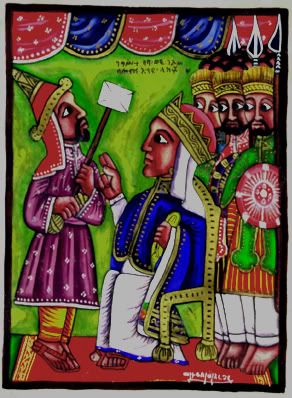The story told in the Kebra Negast was very similar to the Bible in some ways, but its fundamental differences made it a refreshing and fascinating piece of Ethiopian history. Without knowing much context for this writing, it is easiest to focus on the content itself rather than the impact on its readers in Africa.
The first concept that stands out in the beginning of the story was the give-and-take relationships. The rulers of the North and South were both very cooperative with the merchants of their areas. Constituents had supplies, and the heads of state exchanged those for money. While this may be seen as a buy-off situation, the writing displayed it as a more amicable dynamic between people in Jerusalem. There are many more descriptions of the fruitful and prosperous Jerusalem throughout, including wealth and prosperity but also wisdom. This extends to the description of Solomon, who, representing Jerusalem, furthers the benevolence. He serves his people amazingly and speaks to them like equally human individuals with problems he can solve. This is an obvious advertisement for Jews to come to Jerusalem, but the subtleties of the rulers' behavior and thought processes in the stories are what makes the work a convincing push towards leaving Ethiopia.
Wisdom is the most important cause and theme in the Kebra Negast. It supports the well-being of workers and nobles and creates a peaceful environment within Jerusalem in the story. It is the reasoning behind Solomon and the Queen of Sheba's compassion for their people. While Solomon describes it directly as God controlling his thoughts and actions, the queen is described as having developed her wisdom. This trait is an interesting focus for a religious text. Instead of faith or piety, wisdom is a much more humanistic view of living. It is a way to treat people appropriately and handle one's own life responsibly. The portrayal of the queen describes it as a virtue one can acquire over time through deep thought and consideration of the environment. Having wisdom as a cornerstone for religion encourages a "carpe diem" attitude, which leads to a better civilization and more people willing to assimilate into said religion.
The Kebra Negast functions very similarly to a Bible, with its short and captivating stories that follow a larger plot. It stresses a sense of God, but also does not condemn for differences in opinion. The people of Ethiopia are a diverse population religiously, as are the people over which the Queen of Sheba reigns. She even follows a different higher power (the sun) than King Solomon (God of Isreal.) Neither of these rulers is offended by the other, but instead willing to discuss the differences and respect each other for their earthly traits. They each have a good relationship with their countries even if each country does so through a different set of beliefs. This is a concept most important to the Ethiopians. It is not only reasonable and describes a reasonable means of peaceful society, but it is something they can put faith in and use to improve themselves. It is directly applicable to their situation with the assorted churches and caters to their lives rationally.


No comments:
Post a Comment